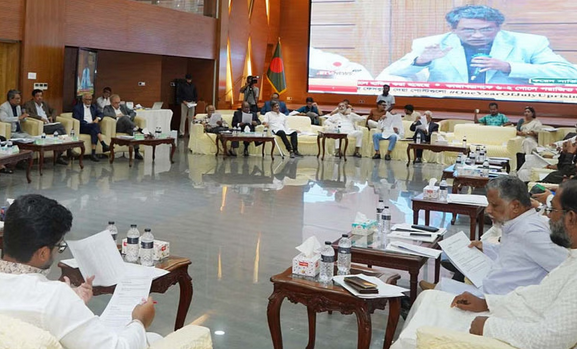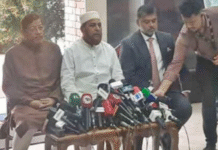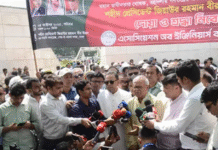Manifesto provision allows top-two judge choice; cabinet to approve emergency declaration
Political parties have reached consensus on the method of appointing the chief justice of the Supreme Court, as well as measures to ensure that the declaration of a state of emergency cannot be misused.
Parties agreed today that the most senior judge of the Appellate Division, based on service, will be appointed as the next chief justice, unless a party commits in its election manifesto to appoint one of the top two senior judges and wins a mandate to do so.
The agreement was reached this afternoon during the 12th day of the second phase of dialogues between political parties and the National Consensus Commission at the Foreign Service Academy in the capital.
The consensus came following a commission proposal to amend Article 95 of the Constitution, which currently allows the president to appoint any judge of the Appellate Division as chief justice.
Earlier in the day, discussions focused on the declaration of a state of emergency, but the topic later shifted to the appointment of the chief justice.
After the break, the commission proposed that the most senior judge in the Appellate Division, based on length of service, would be selected as chief justice. However, if a political party explicitly states in its election manifesto its intention to appoint one of the two most senior judges, and subsequently secures victory in the election, it will be permitted to proceed with that appointment.
BNP Standing Committee member Salahuddin Ahmed said, “We accept that the most senior judge will be appointed as the chief justice. However, we will submit a note of dissent.”
“Our election manifesto will include the option of appointing one of the top two senior judges.”
Hamidur Rahman Azad, assistant secretary general of Jamaat-e-Islami, said, “Our position is that the most senior judge of the Appellate Division should be appointed as the next chief justice. But if another party states in their manifesto they will choose one from among the top two, and the public supports that, we will accept it.”
The commission later announced that if no investigation is ongoing against the senior-most judge under Article 96 of the Constitution, the president shall appoint that judge as chief justice.
Parties also agreed to amend Article 141 of the constitution to ensure that the declaration of a state of emergency cannot be misused for political purposes.
According to the proposed revision of Article 141A(1), the president may declare a state of emergency for a period not exceeding 90 days if satisfied that the security or economic life of Bangladesh is under threat from war, external aggression, or natural calamity.
However, prior written approval from the cabinet will now be required.
The current constitution allows emergency declarations for up to 120 days and requires only the prime minister’s signature.
Based on earlier discussions held on July 7 and 10, the term “internal disorder” would be replaced with more specific threats such as those to national independence, sovereignty, territorial integrity, epidemics, or natural disasters.
To prevent the suspension of fundamental rights during emergencies, the proposed amendment to Article 47(3) ensures that no citizen’s right to life or protection from torture or cruel, inhuman, or degrading treatment or punishment may be violated.
Some disagreement emerged over the cabinet approval clause.
Saiful Haque, general secretary of the Biplobi Workers Party, suggested such decisions be made through an all-party meeting.
Ahmad Abdul Kader of Bangladesh Khelafat Majlish proposed that opposition members be involved in the cabinet’s decision-making.
Syed Abdullah Mohammad Taher, nayeb-e-ameer of Jamaat-e-Islami, proposed that the leader of the opposition be present in cabinet meetings where emergency declarations are discussed.
This proposal was supported by BNP’s Salahuddin Ahmed.
Ashraf Ali Akon, presidium member of Islami Andolan Bangladesh, raised concerns about scenarios in which the leader of the opposition is unavailable and suggested a provision to cover such cases.
Responding to this, Monir Haider, special assistant to the chief adviser, clarified that the deputy leader of the opposition holds the status of a minister.
The final decision was that cabinet approval — not just the prime minister’s signature would be required, and the leader of the opposition or, in their absence, the deputy leader, must be present during such cabinet meetings.
While parties such as Jamaat-e-Islami and the National Citizen Party (NCP) supported the appointment of the most senior judge, other parties, including the BNP, proposed choosing from among the top two.
Before the lunch break, the parties failed to reach a consensus, prompting the discussion to shift toward the issue of the caretaker government.
Source: The Daily Star










